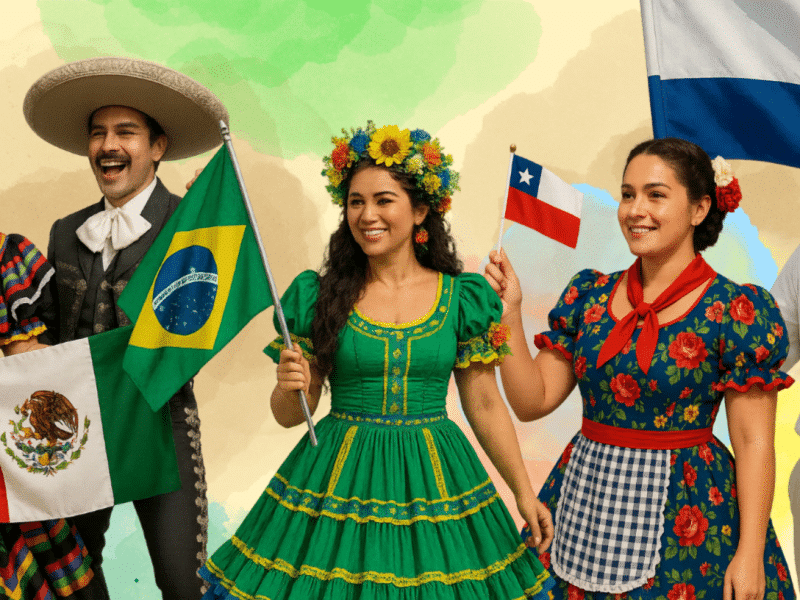How Important is it to Speak Spanish as a Latino? New Findings Revealed
Although most Latinos don’t view Spanish proficiency as a mandatory aspect of Latino identity, a recent study reveals that a significant number still believe it’s important for future generations to speak Spanish. The debate continues

The question of whether the ability to speak Spanish fluently has any bearing on the legitimacy of Latino identity has long been a topic of contention in the U.S. Latino community. While a substantial majority of Latinos don’t consider language proficiency a prerequisite for Latino identity, a recent Pew Research Center report found that regardless, many believe future generations of Latinos should retain the ability to speak Spanish.
The report focused on the perspectives and experiences of U.S. Latinos and the Spanish language. The study also revealed what too many second-generation and beyond Latinos know all too well – that a substantial portion of Latinos who don’t speak Spanish proficiently, particularly among younger demographics, have been on the receiving end of criticism from fellow Latinos.
According to the report’s findings, while 75% of the respondents say they can have a conversation fairly well in Spanish, another 78% of the respondents don’t consider speaking Spanish an indispensable element of their Latino identity. In an interview with USA Today, Laura Muñoz, an assistant professor specializing in History and Ethnic Studies at the University of Nebraska-Lincoln, explains this divergence, saying, “There’s a desire to maintain the language but a recognition that not all of us speak the language, so what are you going to do? Disqualify those people from participation?”
But that’s exactly what some Latinos do when they criticize non-Spanish-speaking Latinos while readily using the term “no sabo” to describe Latinos who don’t speak Spanish. The term is often used as an insult or with negative connotations, but recently, non-Spanish-speaking Latinos have been pushing back and embracing their status as “no sabo” kids as a way of taking back their story and their experiences.
Why Do Some Latinos Not Speak Spanish?
Losing language proficiency in the United States corresponds with generational growth among immigrant families. It’s typical for the children, grandchildren, and great-grandchildren of immigrants to lose their native languages and customs. Typically, the second generation becomes bilingual, while the third generation primarily adopts English as their primary language.
Discrimination often played a role in the erosion of Spanish within Latino families.
Efforts to suppress non-English languages, such as English literacy tests for voting and corporal punishment in public schools for Spanish-speaking children, were pervasive, particularly in the Southwest region of the United States. Spanish-language bias and discrimination persist despite Spanish continuing to influence American pop culture in areas like advertising, music, and film. A 2018 Pew report reported that approximately 22% of respondents reported experiencing criticism for speaking Spanish in public.
The Future of Bilingualism
Although the majority of Latinos don’t equate Spanish proficiency with identity, there remains a strong appreciation for the language’s importance. While the Pew report found that about two-thirds of the respondents consider it very or extremely important for future generations to speak Spanish, the desire to be bilingual diminishes as assimilation progresses. Of the survey respondents, Foreign-born Latinos, at 78%, place greater importance on future generations retaining Spanish proficiency compared to 51% of U.S.-born Latinos. Among U.S.-born Latinos, the importance of Spanish proficiency decreases from 62% among second-generation Latinos to 32% among those of the third generation or higher.
Ultimately, attitudes in the U.S. towards bilingualism will have to shift in order for language preservation and bilingualism or multilingualism to be considered culturally important. According to the U.S. Census Bureau, only 20% of Americans can converse in two or more languages compared with 56% of Europeans. Initiatives such as dual-language programs, which have been increasingly implemented in U.S. schools due to their positive impact on student performance, offer hope for a cultural shift.
Additionally, heritage learning programs such as Spanish Sin Pena are tailored for Latinos raised in bilingual households who want to learn Spanish or improve their proficiency and, as the name implies, wish to do so in a judgment-free space. These programs can effectively serve to instill pride in their language and cultural heritage.
The status of Spanish within the Latino identity is a multifaceted issue, reflecting the complex interplay of linguistic heritage, generational shifts, historical discrimination, and contemporary challenges. As the Latino community navigates these dynamics, efforts to preserve and promote Spanish language proficiency in future generations continue to evolve, as does the identity of Latino itself.




